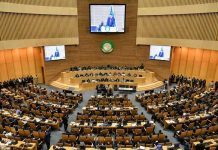Africa-Press – Tanzania. TANZANIA: MONETARY Policy Committee (MPC) has said the ongoing policy interventions by the government to tame dollarisation in the economy will reduce dollar transactions and increase foreign currency liquidity.
According to the MPC report, the financial dollarisation in the banking sector remained relatively high as in the preceding quarters, primarily due to a shortage of foreign currency liquidity in the economy, particularly US dollars.
“However, this trend is expected to reverse following the ongoing policy interventions, including measures taken to reduce domestic dollar transactions in the economy and increase foreign currency liquidity highlighted in the 2024/25 government budget,” the report stated.
The government had issued directives that from July 1st this year all goods and services provided in the domestic market must be charged and settled in the local currency.
While in Parliament recently, the Finance Minister Dr Mwigulu Nchemba announced the enforcement of Section 26 of the Central Bank Act, which designates the Tanzanian Shilling as the sole legal tender.
The minister emphasised that regulations and penalties will be introduced to deter noncompliance with the law.
Dr Nchemba highlighted that quoting prices in shillings for goods and services sold domestically is now mandatory, as part of efforts to address dollarisation and reduce the widespread use of foreign currencies, particularly the US dollar, in transactions by public and private institutions.
The banks’ foreign currency deposits maintained an upward trend since January this year driven by high returns favouring holding and transacting in foreign currency.
In addition, the availability of adequate reserves will continue to provide sufficient cover and a buffer against short-term shocks in the foreign exchange market, thereby restoring public confidence in foreign currency liquidity.
Foreign exchange reserves remained adequate, above USD 5 billion at the end of June 2024, sufficient to cover more than 4 months of projected imports. Foreign currency liquidity improved slightly towards the end of June 2024, attributable to a gradual increase in foreign flows from tobacco, gold, and tourism.
There is anticipation of a further increase in foreign exchange inflows from tourism, mining, traditional exports, and the export of food to neighbouring countries.
The projected improvement in global economic conditions and moderation in the commodity prices in the global market will also contribute. Furthermore, measures to limit transaction dollarisation are expected to increase foreign exchange flows in the banking system.
Meanwhile, the Bank plans to continue increasing the diversification of its foreign reserve portfolio by purchasing gold from local markets.
Foreign exchange liquidity and exchange rate pressures moderated towards the end of June this year in the wake of the improvement of inflows from gold and tobacco exports.
In the Interbank foreign exchange market (IFEM), the exchange rate depreciated by around 2.2 per cent during the quarter compared with 1.8 per cent in the quarter ending March this year.
The retail exchange rate depreciated by around 3.2 percent compared with 1.9 per cent.
For More News And Analysis About Tanzania Follow Africa-Press







